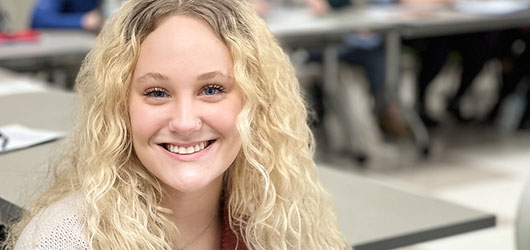Bachelor of Science In Education/Special Education
 Pictured | Kennedy Holst | Bachelor of Science in Education, Special Education / Early Childhood | Knox, Indiana (hometown)
Pictured | Kennedy Holst | Bachelor of Science in Education, Special Education / Early Childhood | Knox, Indiana (hometown)
Volunteer Activity | Community Food Drives
Bachelor of Science In Education/Special Education
The IU South Bend School of Education offers a P-12 Bachelor of Science (BS) Education with a major in Special Education in Mild Intervention. The special education program is designed to prepare teacher education candidates to work with students with special needs who participate in the general education setting and/or special education setting. The program emphasizes the knowledge, dispositions, and skills required of special education teachers, and incorporates the performance standards of the Council for Exceptional Children (CEC).
This degree is designed to prepare individuals seeking initial licensure in mild intervention and for careers teaching children with disabilities in P-12. The professional education sequence of educational programs include coursework in professional education and pedagogy, which includes a curriculum based on practice experience, and a curriculum based on scientifically-based reading instruction, differentiation of instruction and teaching methods, cultural competency, instructional technology, classroom and behavioral management, curriculum development, and the psychology of child development.
Elementary education and secondary education teacher candidates can simultaneously work toward special education licensure in developmental levels (K-6; 5-12 grades) by completing a concentration in mild intervention.
Programs are aligned to standards for the related Special Professional Associations (SPAs).
Academic Advising
Your academic advisor is a critical partner in fostering your success at IU South Bend and beyond. Your advisor will help you explore academic majors and careers, plan your degree, choose classes, learn about internships and study abroad, and much more. To see who is assigned as your advisor, visit your Student Online Advising Record in one.iu.edu. For more information about advising at IU South Bend, visit the website for the Undergraduate Advising Center.
Final responsibility for meeting degree requirements rests with the student.
Questions about advising? Email sbadvise@iu.edu or call (574) 520-4550.
Degree Requirements (120 cr.)
Degree Map >>
Students receiving the Bachelor of Science in Education, Special Education must complete 120 total credit hours including:
- EDUC-F 201 Exploring the Personal Demands of Teaching: Laboratory Experience (2 cr.); AND
EDUC-F 202 Exploring the Personal Demands of Teaching: Field Experience (1 cr.)
Fulfills Fundamental Literacies: Oral Communication requirement
- MATH-M 111 Mathematics in the World
Fulfills Fundamental Literacies: Quantitative Reasoning requirement
- Major Requirements (72 cr.)
- Free Electives (3 cr.)
- An overall GPA of 2.75 is required for admission into the Teacher Education Program (TEP).
- Students must successfully complete EDUC-F 100, EDUC-F 201/202, EDUC-H 340, EDUC-K 205, EDUC-K 300, EDUC-M 311 or EDUC-M 314, EDUC-P 250, EDUC-Q 200, and EDUC-W 200.
- All courses are 3 cr., unless otherwise noted.
Major Requirements (72 cr.)
- COAS-Q 110 Introduction to Information Literacy (1 cr.)
- EDUC-E 333 Inquiry in Mathematics and Science
- EDUC-E 335 Introduction to Early Childhood Education
- EDUC-E 370 Language Arts and Reading I
- EDUC-E 371 Language Arts and Reading II
- EDUC-E 449 Trade Books and the Teacher
- EDUC-F 100 Introduction to Teaching (1 cr.)
- EDUC-K 205 Introduction to Exceptional Children
- EDUC-K 300 Developmental Characteristics of Exceptional Individuals
- EDUC-K 305 Teaching the Exceptional Learner in the Elementary School
- EDUC-K 306 Teaching Students with Special Needs in Secondary Classrooms
- EDUC-K 343 Behavioral and Classroom Management
- EDUC-K 345 Academic and Behavioral Assessment of the Mildly Handicapped Child
- EDUC-K 352 Specially Designed Instruction for Students with Mild to Moderate Disabilities
- EDUC-K 362 Team Approaches to the Education of Students with Disabilities
- EDUC-K 370 Language and Learning Characteristics of Students with Mild to Moderate Disabilities
- EDUC-K 452 Classroom Management
- EDUC-K 480 Student Teaching in Special Education (5 cr.)
Course taken 2 times - EDUC-M 201 Laboratory/Field Experience (2 cr.)
- EDUC-M 301 Laboratory/Field Experience (2 cr.)
- EDUC-M 311 Creating Learning Environments; OR
EDUC-M 314 General Methods for Senior High/Junior High/Middle School Teachers - EDUC-M 359 Health and Wellness for Teachers (2 cr.)
- EDUC-M 401 Laboratory/Field Experience (2 cr.)
- EDUC-M 420 Student Teaching Seminar (2 cr.)
- EDUC-M 464 Methods of Teaching Reading
- EDUC-Q 200 Introduction to Scientific Inquiry
Concentration Requirements (9 cr.)
Special education candidates are expected to complete courses leading to a concentration. Currently, candidates can complete a concentration/minor in Early Childhood Education.
Early Childhood Education (ECE with Certification) 9 cr
(18 cr. with 9 cr. fulfilled by Major Requirements)
- EDUC-E 317 Practicum in Early Childhood Education
- EDUC-E 327 Social Studies Methods and the Family: Focus on Young Children
- EDUC-E 330 Infant Learning Environments; AND
EDUC-M 101 Laboratory/Field Experience (0 cr.) - EDUC-E 335 Introuction to Early Childhood Education
- EDUC-E 370 Language Arts and Reading I; AND
EDUC-M 201 Laboratory/Field Experience (2 cr.)
Free Electives (3 cr.)
Students are required to take 3 credit hours depending on concentration taken.